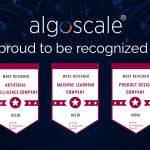Every business application generates tons of data. But what does that data mean?
There is no doubt that data is the most precious commodity for every business. But making sense of that data is crucial. It is even more important to obtain valuable insights from it and use them to make informed business decisions.
With ever-increasing volumes of data, every business needs a scalable data ecosystem. Simply put, a data ecosystem is a cohesive platform that unites data from multiple sources and providers. It helps to process, analyze, and derive meaningful insights from huge volumes of data.
Companies with a scalable and efficient data ecosystem are better empowered to make informed business decisions and lay the foundation for innovation and success.
Azure Databricks and Azure Synapse are two leading technologies that facilitate the creation of robust and resilient data ecosystems. With powerful data processing and analytics capabilities, they enable businesses to harness the full potential of their data.
Today, we will delve into the concept of a scalable data ecosystem. We will also explore how Azure Databricks and Azure Synapse can help businesses build and sustain such ecosystems.
Building a Scalable Data Ecosystem with Azure Databricks and Azure Synapse
Azure Databricks and Azure Synapse are two powerful platforms. Together, they can easily create a scalable data warehouse and fulfill the evolving data needs of modern businesses. The best part about using the two Azure services is their seamless integration. Companies can integrate the two into their business processes and benefit from efficient data processing and analytics.
Before moving any further, let’s discuss the vital features of both Azure services.
Azure Databricks is an Apache-based analytics platform. It offers tools to build, share, and maintain enterprise-grade applications. The platform positions itself as a lake house, i.e., data lake plus data warehouse.
It offers distributed computing power and supports multiple programming languages, making it ideal for managing complex datasets and analytics workloads. The most significant business use cases of Azure Databricks include data exploration, data engineering, and machine learning.

On the other hand, Azure Synapse is a cloud-based analytics service that combines big data and data warehousing capabilities. The platform helps to ingest, prepare, transform, and manage data for business intelligence and analytics purposes.
Synapse improves the insights-generation process by combining the best of Spark, SQL, Studio, Data Explorer, and Pipelines technologies, facilitating seamless integration into Azure services such as CosmosDB, AzureML, and Power BI.


The seamless integration capabilities of Databricks and Synapse allow businesses to combine their data processing and analytics workflows. Once Azure Synapse ingests and processes massive volumes of data from multiple sources, it is transferred to Azure Databricks for advanced analytics. This integration eliminates data silos and streamlines the end-to-end data pipeline, creating an efficient and scalable data ecosystem.
Here are some key steps for organizations to set up and configure Azure Databricks and Azure Synapse together.
- To begin with, create and configure a Databricks workspace within the Azure portal. This serves as the central environment for data processing and analytical tasks. Organizations can also define cluster settings, choose the appropriate virtual machine sizes, and configure storage options.
- Next, organizations must create an Azure Synapse workspace and link it with Azure Databricks. This facilitates quick data transfer between the two services.
- After integration, organizations can use Synapse to gather data from various sources. They can then use Azure Databricks to perform data exploration, data engineering, and advanced analytics on the gathered data.
Best Practices for Implementing a Scalable Data Ecosystem
Building a successful and scalable data ecosystem requires a well-thought-out business strategy. Here are some best practices you must implement to ensure use your organizational data best.
- Build a scalable architecture: Design a flexible and scalable architecture that can easily handle huge volumes of data. Utilize distributed computing, parallel processing, and cloud-native technologies for efficient data processing.
- Data partitioning and sharding: These techniques help distribute data across different servers or clusters. This is an efficient way that allows for parallel processing and improved performance when dealing with large datasets.
- Data classification and access controls: Every organization deals with sensitive and confidential information. Make sure to categorize your data based on confidentiality and apply adequate access controls. It is best to implement role-based access controls to enable only authorized users to access the data.
- Data compliance and auditing: Ensure data compliance with adequate regulations and industry standards. Establish efficient monitoring mechanisms and data lineage to track changes in data and uphold accountability.
These essential best practices can help organizations design and architect a scalable data ecosystem and ensure data security and compliance. They can lay the foundation for a robust solution that drives informed decision-making and unlocks the real potential of data.
Final Words
Building a scalable data ecosystem is important for businesses that want to harness the power of data and drive innovation. Azure Databricks and Azure Synapse are powerful tools with excellent integration capabilities. Together they enable organizations to facilitate seamless data transfer and perform collaborative analytics for informed decision-making.
Businesses need a dependable partner to implement and optimize a scalable data ecosystem effectively. Algoscale possesses wide-ranging expertise in big data engineering services. We can be the ideal partner for organizations looking to leverage Azure Databricks and Azure Synapse to unlock the full potential of their data assets. Schedule a consultation with us today to know more.












